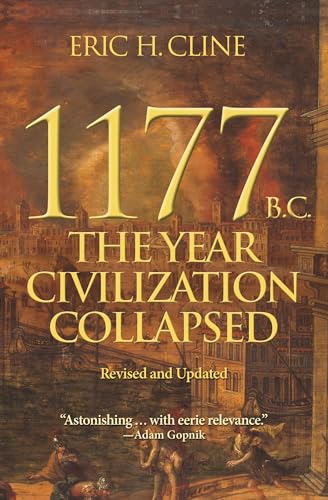1177 B.C.
The Year Civilization Collapsed Revised and Updated (Turning Points in Ancient History)
Eric H. Cline
BOOK REVIEW

The ground trembles beneath your feet as you confront a reality that reverberates through centuries: the collapse of civilization itself. In 1177 B.C.: The Year Civilization Collapsed, Eric H. Cline masterfully weaves a narrative that is not just a history lesson but a heart-pounding exploration of humanity's fragility and resilience. This book doesn't merely summarize events; it thrusts you into the chaos of a cataclysmic era where the very foundations of society crumbled, and the echoes of that collapse resonate in our modern lives.
Picture this: the late Bronze Age, a booming period marked by intercontinental trade, cultural exchange, and sophisticated societies across the Mediterranean. Then-like an earth-shattering dream shattered into a thousand pieces-everything falls apart. Cline dives deep into the events of 1177 B.C., a pivotal year that marked the eclipse of powerful civilizations such as the Hittites, Mycenaeans, and Egyptians. Through meticulous research and vivid storytelling, he doesn't just present a chronology of doom; he paints a vivid tapestry of interconnectedness-how the fates of these ancient peoples intertwined and ultimately led to their collective demise.
Cline, a seasoned archaeologist with extensive expertise in the field, invites you to ponder the implications that extend far beyond dusty artifacts and ancient texts. He presents a convincing argument that the collapse was not the result of a single catastrophe but rather a multifaceted series of events-a perfect storm, if you will-triggered by climate change, invasions, economic instability, and social upheaval. It's a stark reminder that the threads holding our own civilizations together can unravel just as swiftly, igniting deep existential reflections in readers.
As you turn the pages, you can't help but feel the weight of the past pressing down on you. The unsettling reality is that history often repeats itself, and Cline poses challenging questions: What lessons can we glean from these ancient failures? How can understanding the collapse of these civilizations shape our response to contemporary challenges like climate change and geopolitical conflicts?
Critics and readers alike have lauded Cline's ability to make archaeology and history accessible, presenting complex ideas with clarity and vigor. However, some have argued that his narratives occasionally flirt with speculative waters, leaning towards grand interpretations without fully substantiating them. Yet, it's precisely this tension-between certainty and speculation-that makes the book so enticing, compelling you to engage with the material critically and personally.
The reviews paint a portrait of the book that is as vivid and intricate as the civilizations it discusses. Readers find themselves swept away not just by the events described but by the emotional resonance of the narrative. Comments range from awe at Cline's ability to connect dots across millennia to frustration from those who find the jumps in logic too audacious. Still, it is this very audacity that captures the imagination, a beckoning to move beyond mere history and delve into the human psyche during times of crisis.
You may be wondering who has felt the impact of this enlightening work. Scholars, historians, and lay readers alike have turned to 1177 B.C. not just for knowledge but for a confrontation with their own vulnerability in the face of history. It's a book that has inspired thought leaders, educators, and even politicians who grapple with the broader implications of societal collapse-a gripping call to action for awareness and preparedness.
As you digest Cline's findings, the urgency settles in. The past isn't just a series of dusty lessons; it's a living entity that haunts our present. The implications of 1177 B.C. extend beyond mere academics; they implore you to take notice of the world crumbling around us, to question our own systems, and to build a future that learns from the ruins of the past.
In a world eager to forget the mistakes etched into history, Eric H. Cline's 1177 B.C.: The Year Civilization Collapsed not only ignites a fire within but slams you with the stark reality that history's shadows loom larger than ever. What will you do with this knowledge? What will you change in your life upon realizing that we are all interconnected in this grand narrative of existence? Unlock the secrets of civilization's past and grasp the keys to our collective future-let this be more than just a book you read; let it be a spark that fuels your quest for understanding in a world desperate for wisdom.
📖 1177 B.C.: The Year Civilization Collapsed: Revised and Updated (Turning Points in Ancient History)
✍ by Eric H. Cline
🧾 304 pages
2021
#1177 #bc #year #civilization #collapsed #revised #updated #turning #points #ancient #history #eric #cline #EricHCline